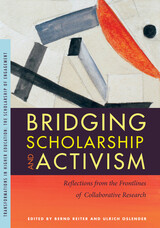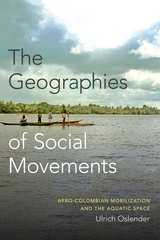2 books by Oslender, Ulrich

Bridging Scholarship and Activism
Reflections from the Frontlines of Collaborative Research
Bernd Reiter
Michigan State University Press, 2015
This timely book brings together activist scholars from a number of disciplines (political science, geography, sociology, anthropology, and communications) to provide new insights into a growing trend in publicly engaged research and scholarship. Bridging Scholarship and Activism creatively redefines what constitutes activism without limiting it to a narrow range of practices. Acknowledging that the current conjuncture of neoliberal globalization has created constraints on as well as possibilities for activist scholarly engagement, the book argues that racism and its intersections with gender and class oppression are salient forces to be interrogated and confronted in the predicaments and struggles activist scholarship targets. The book’s ultimate goal is to create a decolonized and democratized forum in which activist scholars from the Global South converse and cross-fertilize ideas and projects with their counterparts from the United States and other North Atlantic metropolitan-based academy. The coeditors and contributors attempt to decenter hegemonic knowledge and to create some of the necessary (if not sufficient) conditions for a more pluriversal (rather than orthodox “universal”) context for producing enabling knowledge, without the naiveté and romanticism that has characterized earlier projects in critical and radical social science.
CONTENTS:
Introduction, Ulrich Oslender and Bernd Reiter
Part One. The Promises and Pitfalls of Collaborative Research
CONTENTS:
Introduction, Ulrich Oslender and Bernd Reiter
Part One. The Promises and Pitfalls of Collaborative Research
- Of Academic Embeddedness: Communities of Choice and How to Make Sense of Activism and Research Abroad, Bernd Reiter
- New Shapes of Revolution, Gustavo Esteva
- The Accidental Activist Scholar: A Memoir on Reactive Boundary and Identity Work for Social Change within the Academy, Rob Benford
- Leaving the Field: How to Write about Disappointment and Frustration in Collaborative Research, Ulrich Oslender
- Invisible Heroes, Eshe Lewis
- El Muntuen America, Manuel Zapata Olivella
- Activism as History Making: The Collective and the Personal in Collaborative Research with the Process of Black Communities in Colombia, Arturo Escobar
- Out of Bounds: Negotiating Researcher Positionality in Brazil, Elizabeth Hordge-Freeman
- Between Soapboxes and Shadows: Activism, Theory, and the Politics of Life and Death in Salvador, Bahia, Brazil, Christen A. Smith
- State Violence and the Ethnographic Encounter: Feminist Research and Racial Embodiment, Keisha-Khan Y. Perry
- The Challenges Resulting from Combining Scientific Production and Social-Political Activism in the Brazilian Academy, Fernando Conceição
- The Challenge of Doing Applied/Activist Anti-Racist Anthropology in Revolutionary Cuba, Gayle L. McGarrity
- Conclusion, Ulrich Oslender and Bernd Reiter
- About the Authors
[more]

The Geographies of Social Movements
Afro-Colombian Mobilization and the Aquatic Space
Ulrich Oslender
Duke University Press, 2016
In The Geographies of Social Movements Ulrich Oslender proposes a critical place perspective to examine the activism of black communities in the lowland rain forest of Colombia's Pacific Coast region. Drawing on extensive ethnographic fieldwork in and around the town of Guapi, Oslender examines how the work of local community councils, which have organized around newly granted ethnic and land rights since the early 1990s, is anchored to space and place. Exploring how residents' social relationships are entangled with the region's rivers, streams, swamps, rain, and tides, Oslender argues that this "aquatic space"—his conceptualization of the mutually constitutive relationships between people and their rain forest environment—provides a local epistemology that has shaped the political process. Oslender demonstrates that social mobilization among Colombia's Pacific Coast black communities is best understood as emerging out of their place-based identity and environmental imaginaries. He argues that the critical place perspective proposed accounts more fully for the multiple, multiscalar, rooted, and networked experiences within social movements.
[more]
READERS
Browse our collection.
PUBLISHERS
See BiblioVault's publisher services.
STUDENT SERVICES
Files for college accessibility offices.
UChicago Accessibility Resources
home | accessibility | search | about | contact us
BiblioVault ® 2001 - 2024
The University of Chicago Press









